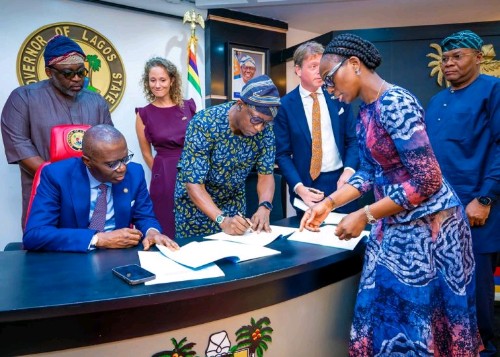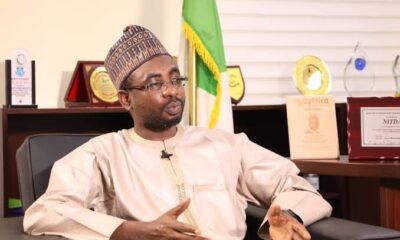Lagos State has made significant progress towards producing useful energy from the amounts of solid garbage produced in the city.
Governor Babajide Sanwo-Olu, on Monday, officially announced a collaboration with Harvest Waste Consortium, a Dutch company, to build a high-efficiency waste-to-energy plant on the Epe landfill. This plant will use cutting-edge technology to produce clean energy from commercial, industrial, and municipal solid waste.
With the technology improving energy security and diversification and producing 60–75 megawatts of baseload electricity yearly, the creative waste management solution is predicted to remove about 40,000 houses from the national electrical grid.
The partnership with the Amsterdam, Netherlands-based firm was at the instance of the Ministry of the Environment and Water Resources, while the agreement was signed under the supervision of the Lagos State Office of the Public Private Partnership (PPP).
Sanwo-Olu said the inadequacies of the current waste disposal practices in the State led to the sealing of the partnership to bring about innovative alternatives towards reducing environmental pollution, improving air quality, and stemming degradation and contamination of water resources that posed threats to the life quality in the State.
The Governor said the partnership represented a “monumental step” forward of his administration’s waste management strategy, stressing that the move marked another milestone in the journey to build a clean, healthy, and more sustainable city.
He said: “Today marks a significant milestone in the journey towards a cleaner, healthier and more sustainable Lagos, as we formalise a partnership with Harvest Waste Consortium. This is a collaboration that promises to transform waste management and energy production in our State.
“The growth of our population signifies progress and opportunity, just as it presents challenges, particularly in managing the increasing volumes of municipal solid waste. We sought innovative and sustainable solutions through extensive consultations, visits, and a thorough exchange of information with our partners from the Netherlands.
“We are thrilled to announce the construction and operation of a High Efficiency Waste-to-Energy plant in Lagos. This state-of-the-art facility will be built with the capacity to process 2,250 tonnes of waste daily, representing a monumental step forward in our waste management strategy. The plant will not only provide a sustainable alternative to the current practice of waste dumping, it will also divert more than 95 per cent of our waste from landfill sites.”
Sanwo-Olu said the initiative would significantly reduce environmental footprint of Lagos waste disposal methods, with the plant expected to trap about 550,000 metric tons of Carbon dioxide and other greenhouse gases emitted daily from dumpsite.
Beyond the environmental benefits, the Governor said the project, which has over 25 years operational lifespan, would stimulate economic activities around the initiative, while attracting major investments to the State and creating jobs.
Sanwo-Olu said the technology had not only proven reliable but had also been tested by the European Commission as the best available technology in terms of efficiency.
“The facility will ensure that the potentially harmful effects of municipal solid waste are minimised, thereby protecting public health and the environment. This project will not only enhance public health and well-being but also contribute to the circular economy by reducing landfill dependency and promoting recycling,” the Governor said.
Commissioner for the Environment and Water Resources, Mr. Tokunbo Wahab, said the partnership created a new mandate for Lagos to seek solid waste management solutions.
He said the partnership would make the State turn its burden to wealth and create new value from waste conversion.
The partnership, Wahab said, is fully backed by the Dutch government.
Deputy Consul General of the Netherlands Consulate, Ms. Leonie Van der Stijl, said the partnership presented the possibility of international collaboration to solve local challenges, noting that Lagos, through the pact, became the first partner of the Dutch waste management.
The envoy gave assurance of the Dutch government’s commitment to the success of the agreement.
Managing Director of Harvest Waste Consortium, Mr. Evert Lichtenbelt, said the firm had built international reputation in managing solid waste in a proper way.
“Amsterdam and Lagos share similar challenges in managing population and waste. What we do is exporting knowledge on managing waste properly. This MoU has set a good pace for both partner. We made a proposal to manage part of the solid waste of Lagos and in future, we can expand,” Lichtenbelt said.


 BIG STORY4 days ago
BIG STORY4 days ago
 BIG STORY5 days ago
BIG STORY5 days ago
 BIG STORY5 days ago
BIG STORY5 days ago
 BIG STORY5 days ago
BIG STORY5 days ago
 BIG STORY4 days ago
BIG STORY4 days ago
 BIG STORY5 days ago
BIG STORY5 days ago
 BIG STORY5 days ago
BIG STORY5 days ago
 BIG STORY1 day ago
BIG STORY1 day ago




















